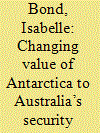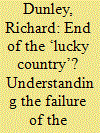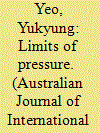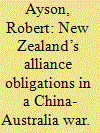|
|
|
Sort Order |
|
|
|
Items / Page
|
|
|
|
|
|
|
| Srl | Item |
| 1 |
ID:
190710


|
|
|
|
|
| Summary/Abstract |
Two years following Myanmar’s attempted military coup, the situation is at a stalemate. Little progress has been achieved against ASEAN’s Five Point Consensus, hailed as a major breakthrough in April 2021. Egregious human rights violations continue, and the military is reportedly losing ground but showing little inclination to negotiate. Facing internal political constraints, ASEAN has requested support from the UN. The Security Council has responded by ‘encouraging the international community’ to support ASEAN to resolve the crisis. The UN’s Special Envoy on Myanmar has for her part declared there is no room for ‘talks about talks’, and that she will focus on alleviating suffering. This commentary argues that the UN should do more. It recalls the Secretary-General’s prioritisation in 2017 of ‘diplomacy for peace’, and his ambitions for the UN’s mediation capacity. It reviews situations elsewhere in which the Secretary-General has exercised his ‘good offices’, through his Special Envoys and Representatives, and observes that the exercise of the Secretary-General’s good offices is typically enabled by a request from the Security Council. This commentary thus explores the possibility of ASEAN initiating such a request, with a view to prompting stronger UN support for ASEAN-led negotiations towards a political settlement in Myanmar.
|
|
|
|
|
|
|
|
|
|
|
|
|
|
|
|
| 2 |
ID:
190708


|
|
|
|
|
| Summary/Abstract |
Antarctica is a crucial regulator of the world’s climate, and as environmental security permeates global security, using Antarctic science to better understand climate is becoming increasingly pressing. Although the Australian Government has recognised that climate change poses ‘a current and existential national security’ threat and has acknowledged Antarctica’s importance regarding the earth’s global climate system, the focus of Australia’s intelligence community pertaining to Antarctica currently remains restricted to upholding the military-security and diplomatic goals of the Antarctic Treaty System (ATS). This current focus aims to hedge against the possibility of conflict on, or over, the frozen continent via ‘working the ATS’, however, this paper argues that Antarctic climate science holds a greater capacity to deliver security outcomes for Australia. Antarctic climate science offers opportunities regarding intelligence for Antarctica, that is, securing Australia’s Antarctic interests, as well as regarding intelligence from Antarctica; by enhancing natural disaster preparedness, bolstering broader strategic planning, as well as furthering diplomacy and the legitimisation of Australia’s leadership on, and over, the frozen continent. It is recommended that the Commonwealth Government establish a climate intelligence working group to ensure the utility of climate science to security and intelligence is realised.
|
|
|
|
|
|
|
|
|
|
|
|
|
|
|
|
| 3 |
ID:
190709


|
|
|
|
|
| Summary/Abstract |
The Australian debate over AUKUS, and its strategic policy more generally, has been notable for its disjointed and incoherent nature. This article seeks to explain why, arguing that Australia has been the beneficiary of a remarkably benign strategic situation for nearly 80 years, something that has distorted our understanding of the underlying landscape.
|
|
|
|
|
|
|
|
|
|
|
|
|
|
|
|
| 4 |
ID:
190706


|
|
|
|
|
| Summary/Abstract |
Perceived threats to sovereignty stemming from trade exposure to China have led to calls for the Australian government to embrace the concept of ‘trusted trade’. This involves using policy levers to drive trade towards markets that have capitals more geopolitically aligned with Canberra and finds practical expression in forms such as ‘friend-shored’ supply chains. A theme of ‘trusted trade’ advocacy is the conscription of existing security-oriented partnerships, including the ANZUS alliance, the Quad grouping and the Five Eyes intelligence-sharing arrangement, to take on economic dimensions. While holding superficial appeal, this paper details why pursuing this policy path would be to learn the wrong lessons from Beijing’s campaign of trade disruption that began in May 2020, and make Australia both poorer and less secure. Three key data points are highlighted that collectively support an assessment that the Australian government’s traditional trade policy approach, emphasising open regionalism, remains overwhelmingly fit for purpose.
|
|
|
|
|
|
|
|
|
|
|
|
|
|
|
|
| 5 |
ID:
190707


|
|
|
|
|
| Summary/Abstract |
In the context of economic interdependence, South Korea, like other countries with asymmetrical trade relations with China, is often seen by its citizens as vulnerable to China’s use of economic power to gain political influence. However, South Korea’s deployment of the THAAD (Terminal High Altitude Area Defense) offers the opposite perspective on South Korea’s vulnerability. Despite China’s coercive policies against South Korean businesses and great leverage over Korea’s economy, China failed to generate a concession regarding Korea’s decision to deploy the THAAD. The question is why? Drawing on the 2016–17 THAAD crisis between South Korea and China, I argue that influence of coercive power will depend on the coercive state’s willingness to pay a cost, the target state’s level of stateness, and the relative intensity of interests related to the policy. This case study helps us understand the circumstances under which China’s use of economic coercion against target countries may be successful.
|
|
|
|
|
|
|
|
|
|
|
|
|
|
|
|
| 6 |
ID:
190705


|
|
|
|
|
| Summary/Abstract |
Amidst concerns that Australia may end up in a military confrontation with China, this article evaluates New Zealand’s formal and informal alliance obligations in such an event. In keeping with Wellington’s current declaratory policy, New Zealand’s obligations would be most pressing if the attack occurred on or near Australia, although these would be less clear if China favoured coercion over violence. New Zealand is also likely to have strong alliance obligations if Australian forces were attacked in the South Pacific, the leading area for Australia-New Zealand security cooperation. If Australian forces were attacked in East Asia, New Zealand may have some obligations under the trilateral ANZUS Treaty despite the suspension of Washington’s commitments to Wellington under the same agreement. While New Zealand’s military capacity to assist Australia in maritime East Asia is limited, this is where a serious clash involving Australian and Chinese forces seems most likely. Enlarging the geographical focus of the trans-Tasman alliance may be logical in this new setting, but it could also be hazardous.
|
|
|
|
|
|
|
|
|
|
|
|
|
|
|
|
|
|
|
|
|